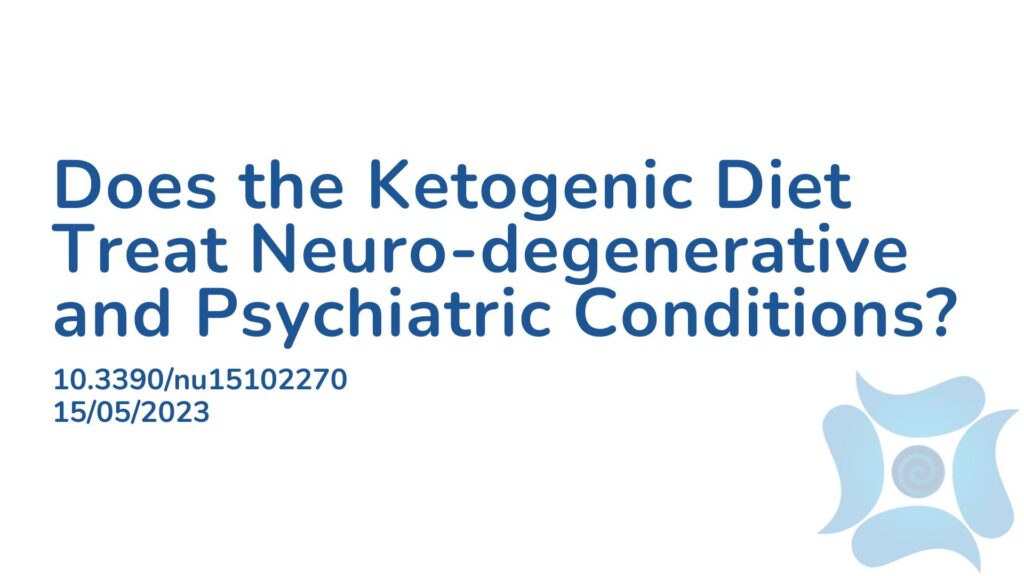Summary:
The ketogenic diet (KD) is defined as a daily dietary pattern including moderate amounts of protein, 10-15g of carbohydrates and remaining calories from fat. The KD has recently gained attention due to its feasibility in preventing and treating obesity and type 2 diabetes. Several papers have also noted a beneficial effect from the KD in epilepsy in both children and adults. Emerging findings are also supporting that the KD may be protective against neuro-degenerative diseases like Alzheimer’s disease, Parkinson’s disease, multiple sclerosis, autism spectrum disorder and psychiatric diseases like depression, anxiety, bipolar disorder, and schizophrenia. This paper thoroughly summarizes the currently available research on the potential benefit of the KD against neuro-degenerative and psychiatric diseases. The research revealed multiple mechanisms through which the KD may exert neuro-protective effects, such as inhibiting neuro-inflammation, reduced oxidative stress and protection of neurons, among other benefits. However, clinical evidence of where this has happened remains limited. The studies that do exist showing this benefit only assess the short-term impact of the KD and are not controlled studies. Several of the clinical studies also had large dropout rates and lack of compliance from the participants. The authors therefore concluded that the KD can exert substantial neuro-protective effects, yet larger and more long-term, randomized controlled clinical trials are strongly recommended to assess whether the KD can be used to alleviate or even treat neuro-degenerative and psychiatric conditions.
Abstract:
Background: The ketogenic diet (KD) has become widespread for the therapy of epileptic pathology in childhood and adulthood. In the last few decades, the current re-emergence of its popularity has focused on the treatment of obesity and diabetes mellitus. KD also exerts anti-inflammatory and neuroprotective properties, which could be utilized for the therapy of neurodegenerative and psychiatric disorders. Purpose: This is a thorough, scoping review that aims to summarize and scrutinize the currently available basic research performed in in vitro and in vivo settings, as well as the clinical evidence of the potential beneficial effects of KD against neurodegenerative and psychiatric diseases. This review was conducted to systematically map the research performed in this area as well as identify gaps in knowledge. Methods: We thoroughly explored the most accurate scientific web databases, e.g., PubMed, Scopus, Web of Science, and Google Scholar, to obtain the most recent in vitro and in vivo data from animal studies as well as clinical human surveys from the last twenty years, applying effective and characteristic keywords. Results: Basic research has revealed multiple molecular mechanisms through which KD can exert neuroprotective effects, such as neuroinflammation inhibition, decreased reactive oxygen species (ROS) production, decreased amyloid plaque deposition and microglial activation, protection in dopaminergic neurons, tau hyper-phosphorylation suppression, stimulating mitochondrial biogenesis, enhancing gut microbial diversity, restoration of histone acetylation, and neuron repair promotion. On the other hand, clinical evidence remains scarce. Most existing clinical studies are modest, frequently uncontrolled, and merely assess the short-term impacts of KD. Moreover, several clinical studies had large dropout rates and a considerable lack of compliance assessment, as well as an increased level of heterogeneity in the study design and methodology. Conclusions: KD can exert substantial neuroprotective effects via multiple molecular mechanisms in various neurodegenerative and psychiatric pathological states. Large, long-term, randomized, double-blind, controlled clinical trials with a prospective design are strongly recommended to delineate whether KD may attenuate or even treat neurodegenerative and psychiatric disease development, progression, and symptomatology.
Article Publication Date: 15/05/2023
DOI: 10.3390/nu15102270




